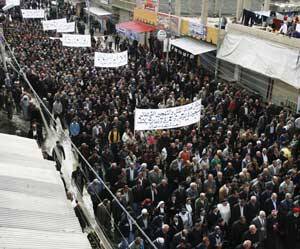More than 1,000 Christians walked through Hamdaniya, a town 25 miles east of Mosul, on Sunday Feb. 28 in an appeal to Iraq’s central government for protection. Many of the silent protestors were praying and carrying olive branches. One banner read, “The blood of the innocents screams for an end to the violence.” More than eight Christians were killed in the last two weeks of February in Mosul. A U.N. report on Feb. 28 indicated that 683 Christian families, or 4,098 people, fled Mosul between Feb. 20 and Feb. 27 following the attacks. The Christian families who remain live in fear for their lives.
Iraqi Christians are among the oldest Christian communities in the world. Since the U.S. invasion in 2003 and the sectarian violence that followed it, many thousands have been forced to leave. The recent outbreak of violence against Christians has come just weeks before Iraq’s parliamentary election, scheduled for March 7, and has been accompanied by deadly car and suicide bombings in other Iraqi cities.
Archbishop Georges Casmoussa, the Syrian-Catholic archbishop of Mosul, said before the Christian demonstration in Hamdaniya: “The community is shocked and wants to draw the attention of the authorities, who so far have done nothing to stop this killing. The march has no political or electoral motives, only religious ones. The Christians want to stay in Iraq and live their faith in peace.”
The date of Feb. 28 is particularly poignant for Iraq’s Christian community, as it marks the second anniversary of the kidnapping of Archbishop Faraj Rahho, the Chaldean archbishop of Mosul who was abducted and killed in a previous campaign of sectarian violence. No Mass was held in Mosul that Sunday morning. Archbishop Casmoussa explained that the time would be “entirely devoted to an act of protest and silent prayer.” He said: “The Eucharist will be celebrated in churches in the afternoon. We will be fasting and praying for peace and for the survival of Christians.”
Addressing pilgrims in St. Peter’s Square the same day, Pope Benedict XVI appealed to the civil authorities in Iraq to protect the Christian population there. Pax Christi International demanded a response to the desperate situation of Iraq’s minorities at the opening on March 1 of the 13th session of the U.N. Human Rights Council in Geneva.
The Pax Christi group noted the “gross and systematic human rights violations of the minorities in Iraq” and warned that these minorities, including Yazidis, Shabaks, Turkoman and Assyrian Christians, “are facing a human rights catastrophe.”
According to a Pax Christi statement, “These groups have been systematically targeted, including by Sunni insurgents who regard them as ‘crusaders’ and ‘infidels.’” Making matters worse, Pax Christi reports, is the ongoing regional power struggle between Kurds and Arabs in northern Iraq. “In order to further their aims, the Kurds have offered minorities inducements while simultaneously exercising repression in order to keep them in tow. Kurdish forces frequently rely on intimidation, threats, arbitrary arrests and detentions to coerce the support of minority communities and in some cases have resorted to extreme violence.
“Today the minorities are being threatened from all sides as they find themselves trapped between the two ethnic rivals,” Pax Christi warned. “Since the withdrawal of U.S. forces from Iraq’s cities in June 2009, the attacks against minority groups have increased dramatically and show no sign of abating.” Pax Christi urged the U.N. council to act “swiftly and vigorously” to save Iraq’s endangered minorities. “As they face these unprecedented levels of violence, the Christians and other minority groups risk being wiped out.”








